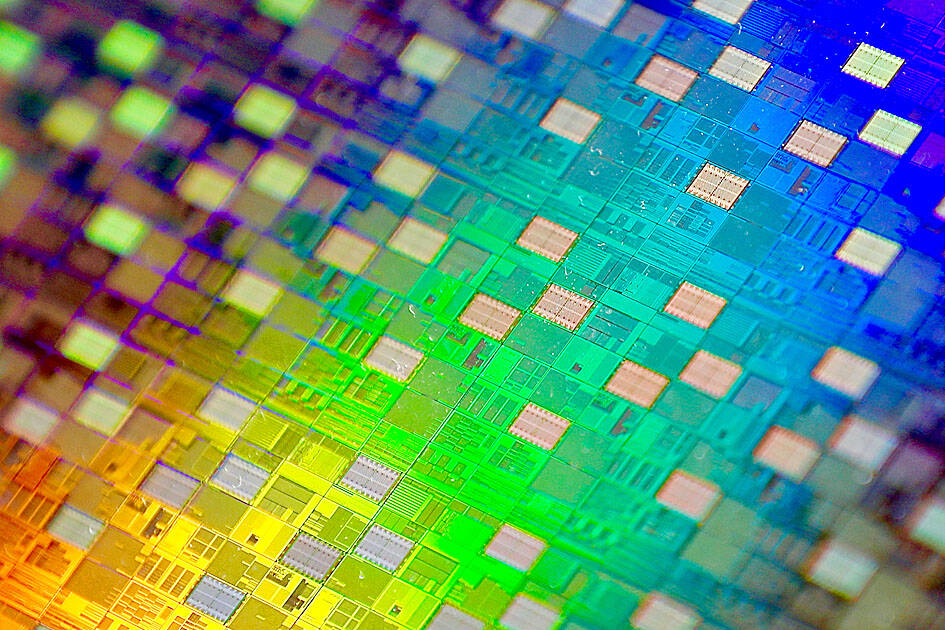Taiwan’s security is key to global security, Academia Sinica Institute of Sociology researcher Wu Jieh-min (吳介民) said about the “Silicon Shield 2.0” strategy he introduced at a security forum last month.
It aims to ensure the security of the Taiwan Strait, allow Taiwan to fully integrate into the international production network and enhance its role in global economic security, because Taiwan’s success is the key to global stability, he said.
“In a world of interdependent semiconductors, the security of one country is the security of all countries,” Wu said. “The semiconductor supply chain is the lifeline of the competition between the US and China. It is not just a technological race; it is a battle for strategic dominance.”

Photo: Ritchie B. Tongo, EPA-EFE
Wu said the “Silicon Shield” theory posits that the world’s dependence on chips from Taiwan might serve to deter Chinese aggression. However, that dependence might also cause Beijing to covet Taipei’s chip production facilities, which would motivate aggression, he said, adding that another possibility is that China would disregard the chips altogether and attack Taiwan for other reasons.
Those possibilities affect strategic views and interests about Taiwan’s security and have a significant impact on global security, he said.
The importance of Taiwan’s chips to the global economy would force major powers, especially the US, to potentially intervene to protect vital lines of defense in the event of a Chinese attack on Taiwan.
Although China has developed its own semiconductor industry, disrupting global supply chains could cause greater harm to the US and its allies than to China, so the possibility of asymmetric damage must also be considered, Wu said.
The US hopes to strengthen its own chip manufacturing capabilities and reduce the risk of over-reliance on a single source, but this strategy is far from a quick fix, Wu said, adding that bringing semiconductor manufacturing to the US is challenging, costly and time-consuming.
In the meantime, the world would continue to rely on Taiwan’s semiconductors, he said.
“That is why the top priority is to ensure security across the Taiwan Strait,” Wu said.
Taiwan must also play a more active role internationally and global investments should be seen as an extension of Taiwan’s influence, he said.
“These investments are in the strategic interest of the US and its allies, and Taiwan and the West deepening their interdependence, would strengthen supply chain resilience,” he said.
The deeper Taiwan’s interdependence with democratic societies around the world, the more urgent the need for economic and security cooperation. However, Taiwan’s international support network is largely bilateral and informal, and cannot cope with increasingly complex geopolitics, he said.
Wu said that to create a safe and resilient semiconductor ecosystem, a comprehensive strategy is needed.
“Silicon Shield 2.0 provides a roadmap to enhance Taiwan’s role in economic security,” he said. “Taiwan’s success is key to global stability and proves that in a world of interdependent semiconductors, one country’s security is the security of all.”

An essay competition jointly organized by a local writing society and a publisher affiliated with the Chinese Communist Party (CCP) might have contravened the Act Governing Relations Between the People of the Taiwan Area and the Mainland Area (臺灣地區與大陸地區人民關係條例), the Mainland Affairs Council (MAC) said on Thursday. “In this case, the partner organization is clearly an agency under the CCP’s Fujian Provincial Committee,” MAC Deputy Minister and spokesperson Liang Wen-chieh (梁文傑) said at a news briefing in Taipei. “It also involves bringing Taiwanese students to China with all-expenses-paid arrangements to attend award ceremonies and camps,” Liang said. Those two “characteristics” are typically sufficient

A magnitude 5.9 earthquake that struck about 33km off the coast of Hualien City was the "main shock" in a series of quakes in the area, with aftershocks expected over the next three days, the Central Weather Administration (CWA) said yesterday. Prior to the magnitude 5.9 quake shaking most of Taiwan at 6:53pm yesterday, six other earthquakes stronger than a magnitude of 4, starting with a magnitude 5.5 quake at 6:09pm, occurred in the area. CWA Seismological Center Director Wu Chien-fu (吳健富) confirmed that the quakes were all part of the same series and that the magnitude 5.5 temblor was

The brilliant blue waters, thick foliage and bucolic atmosphere on this seemingly idyllic archipelago deep in the Pacific Ocean belie the key role it now plays in a titanic geopolitical struggle. Palau is again on the front line as China, and the US and its allies prepare their forces in an intensifying contest for control over the Asia-Pacific region. The democratic nation of just 17,000 people hosts US-controlled airstrips and soon-to-be-completed radar installations that the US military describes as “critical” to monitoring vast swathes of water and airspace. It is also a key piece of the second island chain, a string of

The Central Weather Administration has issued a heat alert for southeastern Taiwan, warning of temperatures as high as 36°C today, while alerting some coastal areas of strong winds later in the day. Kaohsiung’s Neimen District (內門) and Pingtung County’s Neipu Township (內埔) are under an orange heat alert, which warns of temperatures as high as 36°C for three consecutive days, the CWA said, citing southwest winds. The heat would also extend to Tainan’s Nansi (楠西) and Yujing (玉井) districts, as well as Pingtung’s Gaoshu (高樹), Yanpu (鹽埔) and Majia (瑪家) townships, it said, forecasting highs of up to 36°C in those areas